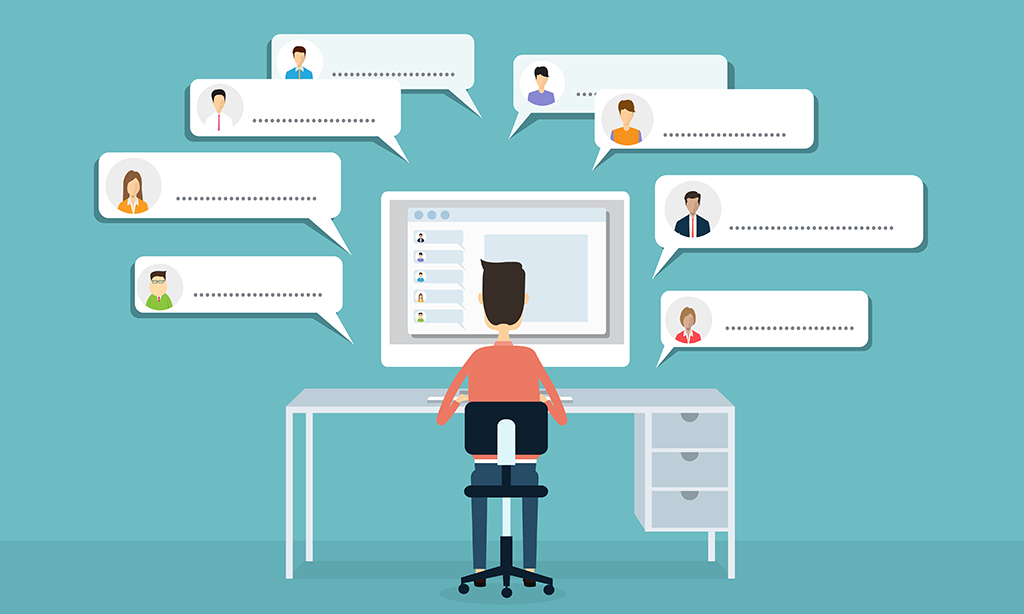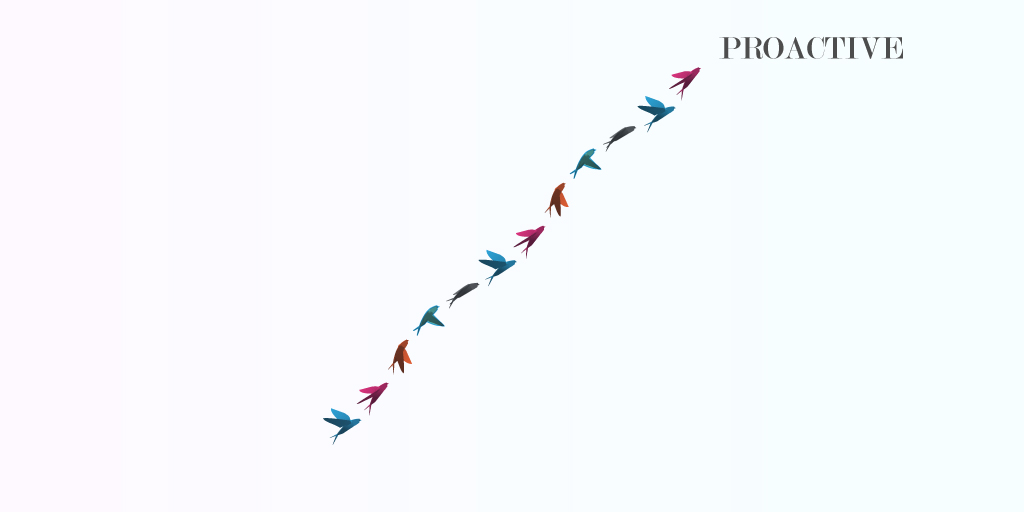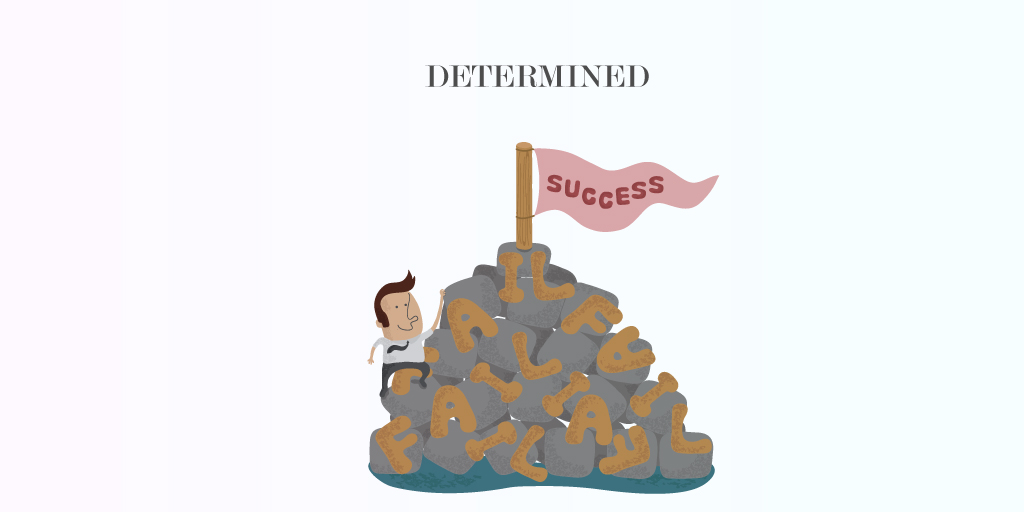
me: “Networking is key to success!”
And I definitely believe that. However, when I first started building my career, I was an 18-year-old going to school in a lovely but secluded spot on the central Californian coast. We were five minutes from the beach—but an hour and 45 minutes from the closest “big city.” I was eager to network. But with who?
Instead of shrugging and saying, “I’ll make connections when I move to New York after college,” I decided to network through the only means available: the Internet.
Here’s what I learned.
Be Selective

It’s easy to get caught up in all of the options. But making an account on LinkedIn, Twitter, Facebook, Slack, GitHub, and Quora, means that instead of having a strong presence on one or two platforms, you’ll have a weak presence on six.
When it comes to forming relationships and building a reputation on social media, consistency and frequency are key. So even if you have accounts on all a bunch of different platforms (which most of us do), for networking purposes, you should pick two on which to focus your efforts.
Wondering which ones to choose?
- Almost every professional is on LinkedIn, which makes it a fantastic choice no matter who you are.
- Twitter is a good community if you’re looking for younger, technologically adept users.
- To connect with your customers (or potential ones), go with Facebook.
- Slack is best if you want a networking experience that’s very similar to real life interactions.
- If you’re a developer, GitHub is more mandatory than optional.
- Quora is good for giving and receiving help.
- Visual creatives should create a portfolio on Behance.
- To find partners and advisors, check out FounderDating.
I decided to do the majority of my networking on LinkedIn and Facebook. LinkedIn has a bizarrely clunky interface, but it’s awesome in your network grows exponentially—every contact you make gives you 10+ potential more contacts. And I like Facebook for the personal element; frequently commenting on other users’ status updates, photos, and links helped me build lots of great professional friendships.
Be Authentic

Unfortunately, networking still has a reputation for being “sleazy”—and networking online can feel even less genuine, since you’re interacting with people’s headshots rather than their actual faces.
To combat this—and generate some useful connections—be as authentic as you can.
For example, if you’re on Twitter, don’t be afraid to give your tweets some personality. Adding humor and individuality to your online presence lets others get to know you just as they would in real life.
If you overcame a big challenge to get to where you are today, consider writing an article about it and posting it on LinkedIn or Medium (or both!) Showing the person behind the online persona will make people trust you and like you. After all, we’ve all got insecurities and vulnerabilities—but most of us don’t willingly reveal them online.
Note: Make sure your authenticity doesn’t become inappropriate. There are some things that should obviously never be shared online! In general, if you think the info would make someone think twice about hiring you, don’t publish it.
Be Proactive

You definitely need to take the initiative when it comes to online networking. Building up a strong, authentic presence is great, but most people you meet online won’t both start the conversation with you and keep it going—which means that responsibility will fall to you.
How you interact with people will vary depending on the platform.
Imagine you’re on Twitter and you come across the profile of fellow entrepreneur who’s got a cool emerging business, some great insights (judging by his tweets, anyway), and a solid following. You’d probably want to follow him, tweet at him, “Impressed by what you’re doing with [company name]! Looking forward to following its growth.”
Then, over several weeks, you’d favorite and re-tweet his tweets, occasionally adding your own comments to spark a discussion.
There’s a good chance he’ll eventually (if not immediately) begin engaging with you.
But you’d need a whole different technique on, say, LinkedIn. After sending a connection request to an interesting person (make sure you personalize it!), you should send a message thanking the person for accepting your request. Then ask a couple thoughtful questions about his or her career, current projects, side gig, etc. If it all goes well, you’ll be able to have a smart, interesting exchange that will lead to future conversations—and ultimately, a relationship.
Be Determined

For every 10 people I tried to engage on social media, I formed long-term connections with two. This low ratio didn’t mean I wasn’t doing all the right things. It’s a symptom of how hard it is to create a relationship online. Every professional is busy, so don’t feel personally rejected if your efforts to reach out are ignored or don’t turn into anything lasting.
But being determined doesn’t mean that you should try over and over again with the same people. If you’ve sent two Facebook messages to someone and she didn’t respond either time, move on to another person. There are so many potential connections out there; your efforts to build your network won’t hinge on any one person.
Being determined does mean that you keep on trying. Send a Facebook message to a couple more people—and maybe tweak your message to see if a new one is more effective in getting a reply. Or perhaps you should try forming connections on a different platform.
Be Helpful

Networking works when you focus on how you can help the other person. I know, it’s counter-intuitive, but if you’ve always been an awesome resource for someone, he or she will definitelly recommend you for a job, pass along a cool opportunity, or even hire you when the time comes!
When you’re networking online, this principle still holds. Use the info on others’ profiles to gauge their needs and see how you could possibly contribute.
Maybe you’re a graphic designer. Why not whip up a custom logo for someone? Or you’ve found an awesome article that you think another professional in your field would really benefit from reading. Shoot it to him or her in a message, with an explanation of why you’re sending it!
Since I’m a writer, I developed a habit of combing through peoples’ websites looking for incorrect grammar or awkwardly worded copy. Once I found something, I’d screenshot it and email the person a very polite suggestion on what to change. This technique got me in the door with some super influential professionals.
Whatever your niche or talent is, you should definitely be exploiting it in your quest to network online.
Final Quick Tips
- Keep your profile picture the same across all your sites so you’re easily recognizable
- Never underestimate the power of a handwritten letter to strengthen or jumpstart a relationship
- Show enthusiasm for others’ side projects; they’ll appreciate the support
- Be open to forming connections with people you don’t necessarily think would be “good to know.” You’d be surprised at how many of those people are, in fact, quite good to know!
These tactics have helped me build a thriving network of professionals across the nation. And if an 18-year-old from Nowhere, California can do it—you definitely can.
Frequently Asked Questions about Networking Anywhere
How can I network effectively when I live in a remote area?
Networking in a remote area can be challenging, but it’s not impossible. You can leverage online platforms like LinkedIn, Facebook, and Twitter to connect with professionals in your field. Participating in online forums and webinars related to your industry can also help you meet like-minded individuals. Remember, networking is about building relationships, so make sure to engage in meaningful conversations and show genuine interest in others.
What are some tips for networking at events?
When attending events, it’s important to have a clear goal in mind. Know what you want to achieve – whether it’s meeting a specific person or learning about a certain topic. Be approachable, maintain eye contact, and listen attentively. Don’t forget to follow up after the event, a simple email or LinkedIn message can help solidify the connection.
How can I overcome my fear of networking?
Networking can be intimidating, but remember that everyone is there for the same reason – to meet new people. Start with small events and gradually work your way up. Practice your introduction and have a few conversation starters ready. The more you network, the more comfortable you’ll become.
How can I maintain my network?
Maintaining your network requires regular interaction. This could be through emails, phone calls, or social media. Share useful information, congratulate them on their achievements, and offer help when you can. Remember, networking is a two-way street.
How can I use social media for networking?
Social media is a powerful networking tool. You can join groups related to your industry, participate in discussions, and connect with professionals. Make sure to keep your profile updated and professional. Share content that showcases your expertise and interests.
How can I network effectively when I’m introverted?
As an introvert, you might prefer deep, meaningful conversations over small talk. Use this to your advantage by asking thoughtful questions and showing genuine interest in others. You can also leverage online networking, which can be less overwhelming than large events.
How can I network without seeming pushy?
Networking is about building relationships, not selling. Show genuine interest in others, listen more than you talk, and offer help when you can. Remember, networking is a long-term investment, so don’t rush the process.
How can I find networking events?
You can find networking events on platforms like Meetup, Eventbrite, or LinkedIn. Industry associations and local business groups often host networking events as well.
How can I prepare for a networking event?
Before the event, research the attendees and speakers. Have a clear goal in mind and prepare a few conversation starters. Make sure to bring business cards and dress appropriately.
How can I follow up after a networking event?
Following up is crucial in networking. Send a personalized email or LinkedIn message within a few days of the event. Mention something you discussed and express interest in staying in touch.
Aja Frost is a writer, tech/design geek, and podcast addict. Check out her site or say hi on Twitter.
